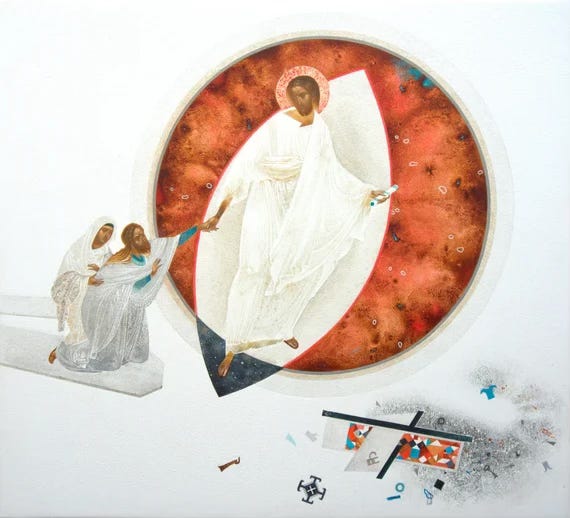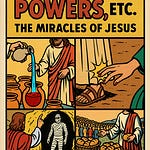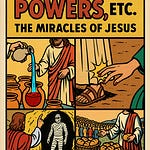In speaking at the Mockingbird Conference in NYC yesterday, I mentioned to the audience that I needed to leave early in order to preach a funeral. The service, I noted, was for a young mother of two in my congregation. Several young preachers in attendance asked if they could listen to how I proclaimed the gospel in the face of a “difficult” death.
Despite my reputation, I tend to do what I’m asked to do.
So here it is:
Isaiah 43, 2 Timothy 4, and John 11 - A Service of Death and Resurrection
Given Laura’s fascination with J.R.R Tolkien, perhaps our watchword for today should come neither from the prophet Isaiah nor the apostle Paul. Given Ruthie’s and David’s Halloween costumes this fall, maybe we should look for an anchoring promise not in Bethany just beyond Jerusalem but in Middle Earth. In the Fellowship of the Ring, Frodo confesses his grief to Gandalf the Grey. Exhausted by inexplicable sadness, Frodo acknowledges a burden we have all borne here this afternoon.
“I wish it need not have happened in my time,” says Frodo.
“So do I,” Gandalf replies, “and so do all who live to see such times. But that is not for them to decide.”
I wish it need not have happened in my time.
I wish I need not be here today.
I wish not one of us were here.
Frodo merely admits to Gandalf what the sister of Lazarus laments to Jesus.
“LORD, if you had been here,” Martha accuses Jesus, “My brother would not have died!” In other words, it need not have happened in my time.
When I first learned of Laura’s sudden, shocking death, I felt chastened by relief that the last service she attended here was not wasted on something other than gospel. Likewise, I do not want to risk anyone leaving here today having not heard the promise called gospel. Not only does the promise matter for all things that matter, it mattered to Laura; jus so, I hope it will matter to you too. Jesus could not be more explicit in handing the promise over to a family and friends not altogether different from you.
“I am the Resurrection and the Life, Jesus says to the sister of Lazarus, who had been dead four days. “I am the Resurrection and the Life, those who believe in me, even though they die, yet shall they live, and everyone who lives and believes in me will never die,” Jesus says to the grief-stricken Martha, right before he asks her, almost as an afterthought, “Do you believe this?”
“I am the Resurrection and the Life, even though you will die yet will you live— do you believe this?”
“Will you? Live again? Do you trust this?” Jesus asks Martha.
And Martha, her eyes salty and pink with tears and her voice hoarse with rage, Martha replies, “Yes, yes, I believe.”
But probably— let’s be honest— probably Martha wants to say no.
“No, I do not believe. No, it's too hard to believe. No, it's too easy to believe. It's foolish and silly— it’s not scientific— to believe in Resurrection and Life.”
After all—
By the time Jesus bothers to show up, her beloved is four days dead.
Dead.
And he didn't have to be.
His was an unnecessary death.
When Lazarus first fell ill, Martha had sent word to Jesus, “Your friend whom you love is ill. Do something! Help!” But for whatever reason, the warning was ignored. There was unnecessary and fatal delay.
The Great Physician didn’t show up.
By the time Jesus arrives, it's too late, and by Martha's estimation, it's every bit unnecessary, “I need not have happened in my time!” In other words, it's your fault, Jesus. It's your fault, LORD.
To Jesus' question about the Resurrection, Martha says, “Yes, I believe.”
But— I'm willing to bet she felt like saying no.
Scripture calls it the Enemy for a reason.
It's darn hard to believe in the face of Death.
We don't know the why or the how of Lazarus' death.
We don’t know if he had lived with a chronic condition since childhood. We don’t know if he’d earned a PhD from Temple University. We don’t know if he had a spouse who would mourn an unfinished future. We don’t know if he loved the parents who’d reared him in faith or if he, in turn, made it a priority to nurture his own children in the gospel.
John the Evangelist does not supply us with many details about Lazarus.
We don’t know if he loved to garden and knit and cook.
We don’t know if he listened to podcasts and audio dramas.
We don’t know if he had a little boy who loved Monster Trucks.
All John tells us is that Lazarus has died.
And he didn’t have to be dead.
"Why didn't you do anything, Jesus? Why didn't you stop it,” Martha asks.
And I'm willing to bet she poked Jesus in the chest when she said it, or even slapped him across the face.
“I am the Resurrection and the Life. Do you believe this?” Jesus asks her.
Martha’s mouth says, “Yes.”
But her heart?
“Do you believe it?”
Do you?
Do you?
For all of us who love Laura, we’re all Martha today.
Some of you would say, “Yes, I believe,” but really— if you're honest— the answer is, “No.” For others of you, the answer is no. You don't believe. You don't believe that Jesus is the Resurrection and the Life, but God, you want the answer to be yes. You don't want Death to have the last word. Still others of you, you want to have a Martha-like angry word with the LORD. “Why didn't you do anything, Jesus?!”
The yes on Martha's lips, the no on her grief-heavy heart, the righteous anger in her throat and in her eyes— we’re all somewhere in between today.
We're all Martha.
I've presided over enough funerals to know what it feels like, to feel like the answer is, “No. No, I don't believe.”
I do not know all of you here so I can't speak for you.
But I can say that Jesus of Nazareth was one of only hundreds of thousands crucified by Rome, all of whose names are lost to history.
I am convinced that had God not raised him from the dead, we never would have heard of Jesus of Nazareth.
And Laura so believed too.
The first conversation I had with her was over pancakes and sausage at a Fat Tuesday dinner the night before Ash Wednesday. After introducing me to David and Ruth, she said, simply and unabashedly, “Jesus is important to me. Thank you for preaching like he’s important to you too.”
In other words, “Yes, I believe. Yes, he’s the Resurrection and the Life.”
What the Gospel of John intends us to see in this passage is not simply Martha’s family but the life of us all. Recall how when Mary Magdalene comes to the garden tomb on Easter morning to mourn, she mistakes the risen Jesus for the gardener because Resurrection and Life are too good for her to believe.
She mistakes Jesus for the gardener.
Laura tirelessly taught Sunday School and led Children’s Church and volunteered for Vacation Bible School. Laura would catch the connection. Gardener is the job Adam was given by God to do in Eden, which is to say this risen Jesus, he is who we are meant to be. He is who we will become. What God does with him, God will do with us all. His resurrection is but the first fruit of a creation-wide cosmic garden that God is growing.
When Mary Magdalene realizes it's really Jesus, she grabs a hold of him.
And in her hands, she clasps his nail-scarred hands.
Notice, his scars are still there.
In his hands, in his feet, in his side, he still bears his scars.
That is, the life he lived hasn't vanished.
It's been vindicated.
The risen Jesus still is the crucified Jesus.
He is who he was.
That Mary mistakes Jesus for the gardener, what Adam was meant to be, that he still bears his scars and his wounds reveals what Christians mean by that word Resurrection.
Namely, this world, this life, it matters.
It matters to Almighty God.
Any kind of thinking or religion or piety or spirituality that suggests our ultimate destination is an evacuation from this world has nothing to do with Christianity, nothing to do with Resurrection.
Mary mistakes him for the gardener; therefore, Resurrection means that God has not abandoned the garden that he planted. God didn't send the ghost of Jesus back to the world to say, “Don't worry, after you die, you'll be okay.”
God resurrected Jesus.
The Resurrection of Jesus Christ tells us something about what God has planned for the world, what God has planned for us, what God has planned for Laura.
God plans to restore this world. The risen Christ still bears the scars life gave him. Therefore, Resurrection means that God is not interested in throwing out this world and moving on to something else somewhere else. If that were the case, why on earth go to the trouble of raising Jesus' body from the dead. And not just him, but God raised him as the first fruit of God raising us all. God didn't say it's enough for Jesus to come home to heaven now that he's died. No. God raised Jesus from the dead.
Therefore—
Resurrection means this world that God made matters.
Resurrection means this world, this life, our hopes, our longings, our pain, our work, our choices, our relationships, our emotions, our bodies— literally everything, it all matters.
Every Sunday morning where Ruthie said to Elaine or me, “Wait to you see what my Mom has planned for Children’s Church today. You’re going to like it!”
The Easter Sunday Laura brought David forward for the sacrament for the first time.
The camping trip where Ruth responded to a frightening storm by singing the words Laura had taught her at Vacation Bible School, “Even in the stormy weather/When it seems to tough/I will not be afraid…”
All of it— it matters; it matters to God.
The Sunday two Advents ago when Laura responded to the photo I snapped of David in his Christmas Pageant costume by saying, “Even without the costume, he’s my angel.”
These Sundays since Epiphany when Bob has brought the kids here to keep what mattered to Laura mattering— all of it matters.
Falling in love at Frostburg State.
Laboring at Georgetown for cognitive recovery.
Apprenticing the kids into Lord of the Rings fandom.
All of it.
Every bit of it.
All of your loved ones and every bit of your life with them.
It all matters.
It all matters to God.
When folks come to me to plan a funeral for a family member, they always want to tell me how they want the service to be a celebration of life. I hate that language. I hate it because it doesn't lift the language. For one, it compels us to be dishonest. It attempts us to lie and ignore our feelings of grief and confusion. It forces us to ignore the fact that not every part of our lives is a cause for joy.
But for another, I hate that celebration of life language because it doesn't go far enough in the celebration. We're not celebrating a life that's now lost, now past, alive only in our ability to remember it?
No!
The Christian hope is different and better than the ending of Star Trek II, The Wrath of Khan.
This funeral is a celebration of Resurrection.
We're not celebrating a life that's now lost, now passed, alive only in our memory of it. We're celebrating a life that God is determined to recover. A life that is now present to God and will be future, will live again. Mary mistakes him for the gardener. He still bears the holes in his hands. Resurrection means God doesn't scrap creation. God doesn’t throw things out. Resurrection means that even if we forsake our life, God does not forsake us. Resurrection means God will reclaim everything, redeem everything, renew everything, heal all.
Belinda Carlisle was right.
She just got the tense of her verbs wrong.
Heaven will be a place on earth, a new earth, a new creation, and nothing will be lost.
Nothing will be forgotten.
No one will be forsaken.
Everything broken will be mended. Every wound will be healed.
As Samwise Gamgee says on Mount Doom in Return of the King, “Every sad thing will come untrue.”
Remember— these nerdy quotes are all for Laura’s sake. But they’re also the gospel. Like Laura, Tolkien was both an accomplished professional and a professing Christian.
Every sad thing will come untrue.
The Future will be what Tolkien called a Euchatastrophe.
And the scars that will remain will do so only to remind us that all of it, all of our lives, are gifts.
Resurrection means that in the End, God gets what God wants. And what God wants is to give the gift anew.
“I am the Resurrection and the Life. Those who believe in me, even though they die, yet shall they live. And everyone who lives and believes in me will never die. Do you believe this?” Jesus asks.
I realize occasions like this draw all sorts of people from all kinds of places. I can't make assumptions about what you believe or don't believe. But Christians are those people who trust the yes, even when we feel like the answer is no. Christians are the people who dare to live beautiful, complicated lives, lives of forgiveness and mercy and inconvenient love, lives that make no sense if the answer to Jesus's question is not, “Yes.”
Christians are the people who live as though we will live on as Jesus lives on— as the unique and unrepeatable persons we have been since the moment of our conception. Live on, body and soul, glorified as was with Jesus in the garden, the first fruits of the resurrection, able to be seen and touched and held and heard.
Again, Christians are those who believe we are not ghosts in the machine that go back to being ghosts, nor are we mere material that becomes one again with the rest of creation.
Christianity is not spirituality.
Christian hope is particular and personal and unapologetically material.
We are destined for external embodied existence where all the things that made us who we are as one of a kind, divine image-bearers, laughter and courage and generosity and brilliant thoughts and selfless deeds, skin and bones.
All of that will inhabit individual bodies that have something resembling hands and feet and fingerprints and nucleic acids, all made alive again forever, somehow redeemed by the humble power of God's love.
Christians believe that God keeps all the information of us and all the mystery about us and that the God who created everything from nothing knows how to raise all of Laura from death.
That's our hope.
That's what we mean by Jesus being the Resurrection and the Life.
“Do you believe this?”
Funny thing is, even if you don't, it doesn't change what God's going to do.
Because if Resurrection is shorthand for anything, it’s short hand for God being faithful to us.
Each of us.
Every one of us.
All of us.
All of her.
Or as the VBS song Laura taught her children continues, “Even when the dark surrounds me/Everything gettin’ rough/I will not be afraid/Cause there’s a promise He has made/and It’s not a promise He will break.”













